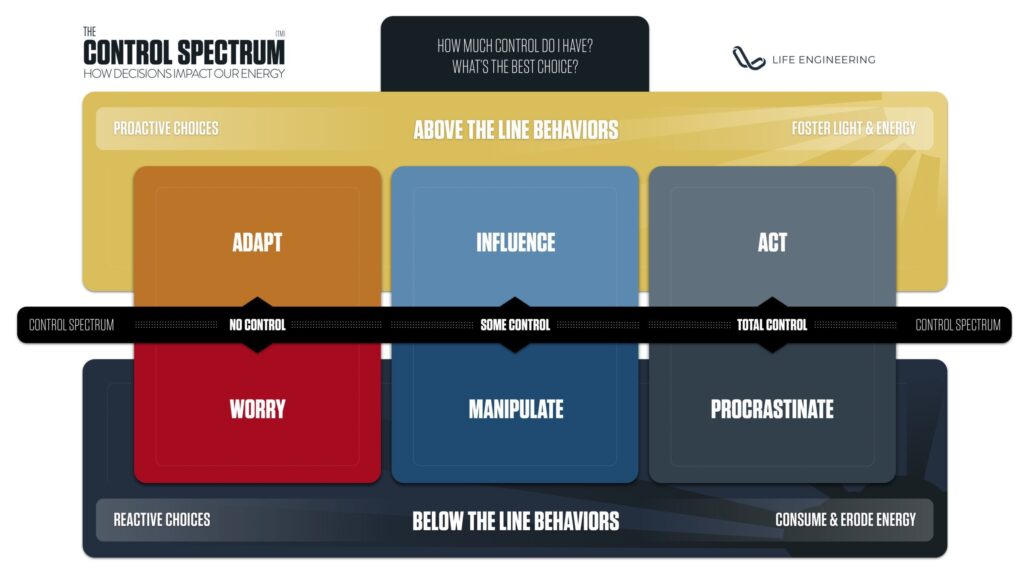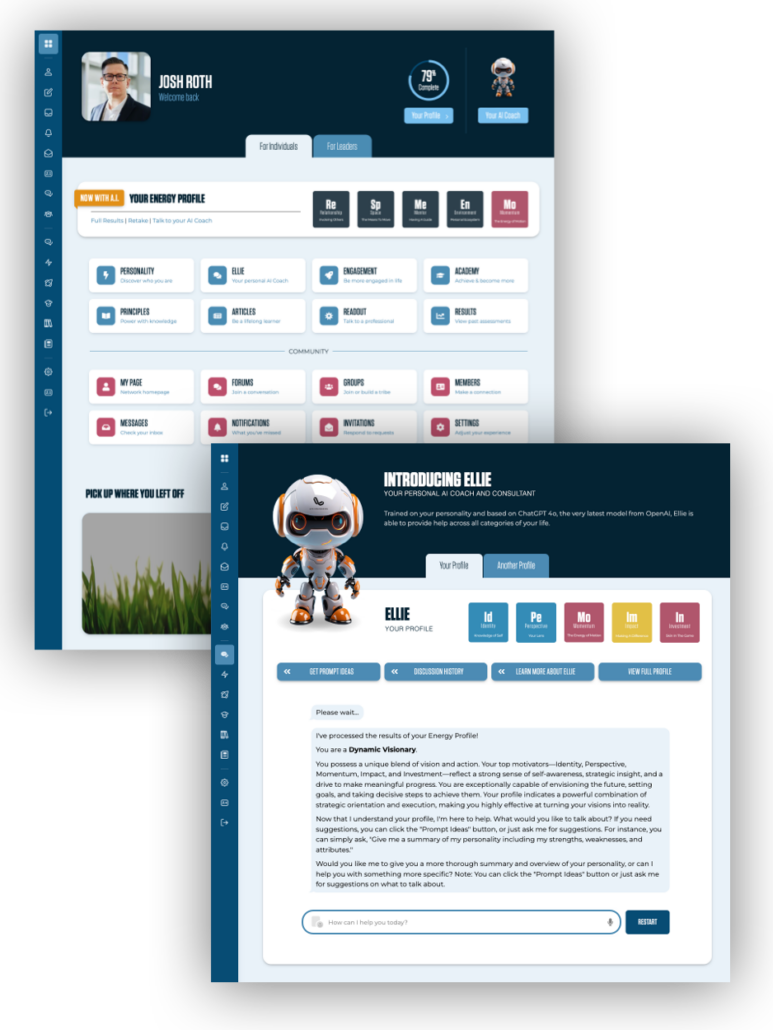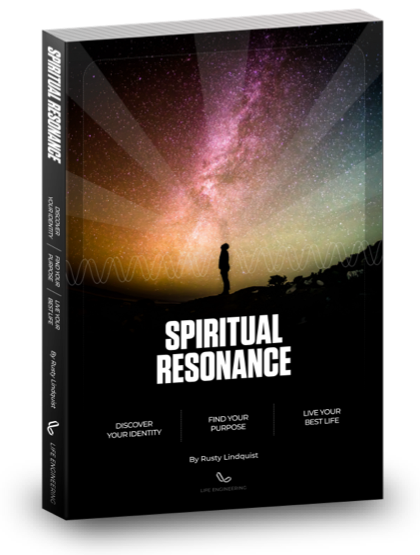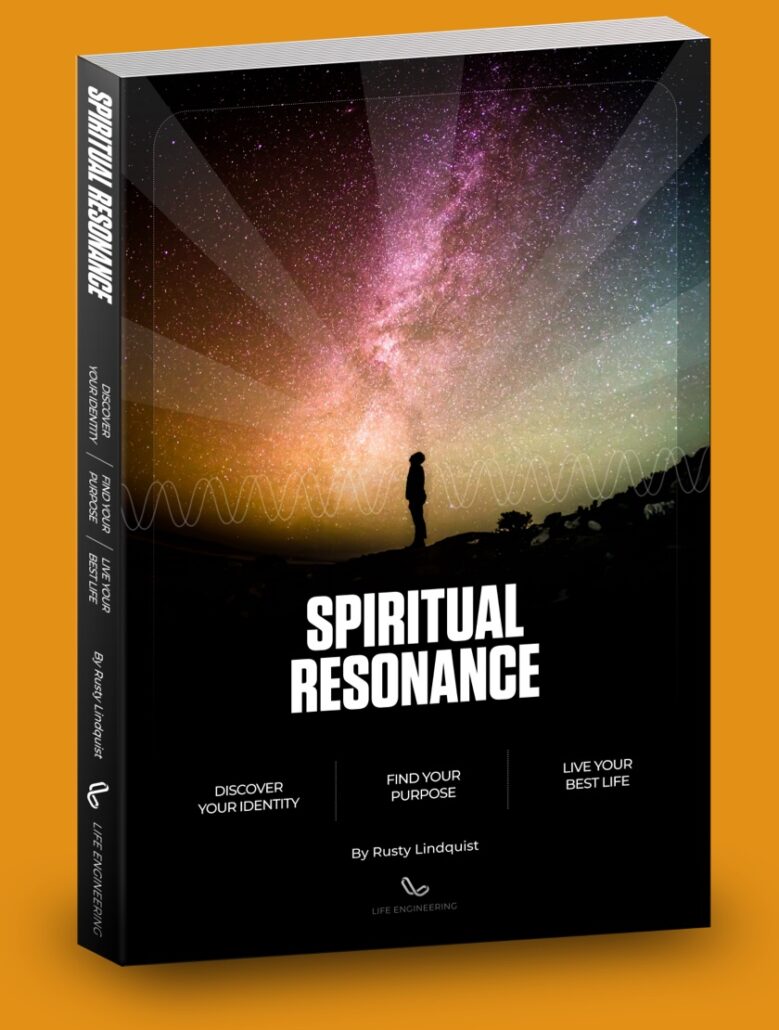Foundations
The Control Spectrum
optimize your energy with two simple choices
academy
Lesson 1
A Simple Truth
The Only Problem in My Life is Me
One of the fastest ways to gain proper perspective in life is to realize this one simple truth: The only problem in my life… is me. Even though it sounds simple, if accepted, the result is real.
When you realize this one simple truth, you suddenly gain power and perspective to make energy-creating decisions. There’s a power in accepting responsibility for the outcome of our lives.
reflection activity
Taking Responsibility
Taking responsibility for the circumstances of our lives can be difficult, and we often default to a perspective where the difficulties we face are because of somebody else. But this is a self-restricting belief that limits the control you actually have, and therefore limits your ability to do what needs to be done to resolve it. Though difficult, think deeply about the question in the activity below, and try answering it as best as possible.
Activity: Taking Responsibility
Lesson 2
The Model
The Control Spectrum
There are really only three main areas of control… no control, some control, and total control. Learning to properly differentiate between the three is the first step in understanding this simple but powerful model.
reflection activity
How Much Control Do You Have?
With the Control Spectrum model in mind, let’s see if you can identify an area in your life that falls into each category. First, try doing so in the activity below.
Activity: How Much Control Do You Have?
Lesson 3
Choose to Adapt
No Control
Every day of your life, you will encounter things over which you have no control. When that happens, you have two options… you can either adapt, or you can worry. They have very different energy outcomes.
reflection activity
How Can You Adapt?
Learning to quickly identify when you have NO control allows you to quickly choose to adapt, rather than worry. The more you try this, the easier it becomes and the faster you learn to recognize a “no-control” situation so you can adapt.
Consider those areas you have no control in the activity below.
Activity: How Can You Adapt?
Lesson 4
Building Influence
Some Control
The “Some Control” area of the control spectrum is the largest and most frequently encountered aspect of control, especially as it pertains to interactions with others.
In these scenarios, we often tend to drift toward the over-use of power, authority, or “control” and we move into manipulation. The better option is to influence.
reflection activity
How Can You Influence?
Areas in our lives where we only have “some” control can also be some of the most difficult, leaving us with only the ability to influence. It’s especially easy in times like these to over-exert (or try to pretend to have) authority. It takes practice to get this right.
Consider those areas you have some control in. Answer the questions in the activity below.
Activity: How Can You Influence?
Lesson 5
Take Action
Total Control
When it comes to Total Control, there’s one category that always falls here… your choices. Whenever you have a choice to be made, you will always do better by acting than procrastinating.
reflection activity
How Can You Act?
In instances where we have total control—like making a decision—we are wise to optimize for ACTING, which keeps us in movement (the Element of Momentum, in the 16 Elements). And because the energy of movement fuels more movement, this keeps us in motion and moving forward.
Consider those areas you have total control. Answer the questions in the activity below.
Activity: How Can You Act?
Lesson 6
The Critical Questions
The Two Questions
With this model now in mind, these three basic levels of control really comes down to two basic questions.
Learn to quickly ask yourself “how much control do I have?” and “what’s the best use of my energy?” in each case.
reflection activity
Ask Yourself These Two Questions
Integrating this model into your life, like anything, takes practice. The more you practice and are deliberate about applying this, the more second-nature it becomes. The more second-nature it becomes, the more quickly you’ll be able to make decisions and the better your decisions will be, keeping you “above-the-line.” Let’s practice in the activity below.
Activity: Ask Yourself These Two Questions
By Way of Illustration
Using a personal story to illustrate the balance between these three areas of control, we learn about the difference between “principle” and “process.”
The approach to take in complex situations is to ask yourself the two basic questions. How much control do I have here? What is the best use of my energy?
Lesson 7
Conclusion
In Conclusion
If you can learn to look at the decisions you make in your day through this lens of the two questions; and as you ask those questions, spend more of your energy acting, influencing and adapting instead of worrying, manipulating, and procrastinating, you will have a better experience in the moment and will move farther along your personal Journey to Purpose.
We care deeply about helping you live your best life.
So much so, that I want to give you a free copy of my most recent book, Spiritual Resonance, to help you fully discover yourself and live authentically.
We’ve also created an assessment to help you discover your Identity, and have trained AI to understand and talk to you about your specific results!





Responses
great page!